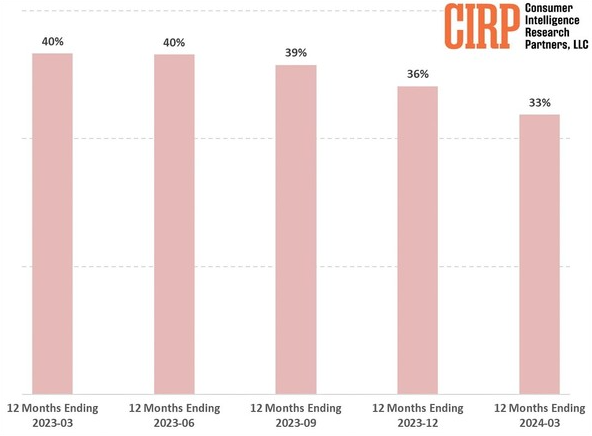Home >Technology peripherals >It Industry >iPhone's newly activated market share fell to a six-year low, the smartphone market is ushering in changes
iPhone's newly activated market share fell to a six-year low, the smartphone market is ushering in changes
- WBOYWBOYWBOYWBOYWBOYWBOYWBOYWBOYWBOYWBOYWBOYWBOYWBforward
- 2024-04-25 13:46:301292browse
News on April 25th. Recently, the news that the iPhone’s market share of newly activated smartphones in the United States has jumped to its lowest level in six years has attracted widespread attention. This change not only sounded the alarm for Apple, but also reflected the deep-seated changes in the smartphone market.
According to data from market research institutions, the iPhone’s share of newly activated smartphones has dropped to one-third, a significant decline from about 40% in the past year. At the same time, devices from the Android camp accounted for two-thirds of newly activated devices. This trend is quite similar to what happened six years ago when iOS and Android teamed up to defeat BlackBerry and Windows Phone.

There are many reasons for the decline in iPhone activation rate. As smartphone prices continue to rise, so do their overall product quality and durability. Today, a well-maintained high-end smartphone can often last three to five years or more. This, to a certain extent, suppresses consumers’ need to frequently replace their phones with new ones.
In addition to changes in mobile phone purchase patterns, they also have an impact on activation rates. In the past, consumers often purchased mobile phones through two-year contract subsidies, and now, more transparent and flexible full-price purchase and installment plans have gradually become mainstream. This allows consumers to no longer be bound by contract terms and can flexibly choose when to upgrade their equipment based on their needs.

For Apple, the extended life cycle of smartphones poses special challenges to its business model. Apple has long relied on consumers' enthusiasm for new iPhones and shorter replacement cycles to drive sales growth. However, the current slowdown in activation share growth undoubtedly reflects changes in consumer behavior in the smartphone market. As the technology of smartphones matures, the innovations and updates of the new generation of iPhones have become relatively small, which has led to a longer replacement cycle for consumers. At the same time, the current slowdown in activation share growth may also reflect the saturation of consumer demand for high-end smartphones in the smartphone market.
According to the editor’s understanding, consumers are now more inclined to wait for more significant updates or technological changes before considering replacing their mobile phones, and are no longer as keen on frequent replacements as before. Whether this trend is a short-term fluctuation or a long-term change in consumer purchasing behavior remains to be seen.
The decline in iPhone activation rate is not only a problem that Apple needs to face, but also reflects the deep-seated changes in the entire smartphone market. In the context of changing consumer behavior and market environment, how to adapt to and seize new market opportunities will be a question that all smartphone manufacturers need to think deeply about.
The above is the detailed content of iPhone's newly activated market share fell to a six-year low, the smartphone market is ushering in changes. For more information, please follow other related articles on the PHP Chinese website!

